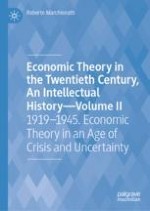
2021 | OriginalPaper | Buchkapitel
3. Economics in London: The London School of Economics (LSE)
verfasst von : Roberto Marchionatti
Erschienen in: Economic Theory in the Twentieth Century, An Intellectual History—Volume II
Aktivieren Sie unsere intelligente Suche, um passende Fachinhalte oder Patente zu finden.
Wählen Sie Textabschnitte aus um mit Künstlicher Intelligenz passenden Patente zu finden. powered by
Markieren Sie Textabschnitte, um KI-gestützt weitere passende Inhalte zu finden. powered by